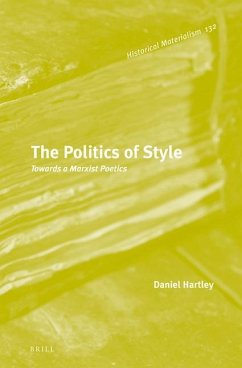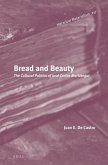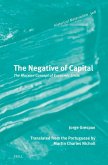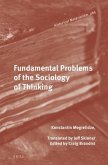Schade – dieser Artikel ist leider ausverkauft. Sobald wir wissen, ob und wann der Artikel wieder verfügbar ist, informieren wir Sie an dieser Stelle.
- Gebundenes Buch
- Merkliste
- Auf die Merkliste
- Bewerten Bewerten
- Teilen
- Produkt teilen
- Produkterinnerung
- Produkterinnerung
This book develops a Marxist theory of literary style via a critical investigation of the work of Raymond Williams, Terry Eagleton and Fredric Jameson.
Andere Kunden interessierten sich auch für
![Infinity for Marxists Infinity for Marxists]() Christopher NealonInfinity for Marxists172,99 €
Christopher NealonInfinity for Marxists172,99 €![Bread and Beauty: The Cultural Politics of José Carlos Mariátegui Bread and Beauty: The Cultural Politics of José Carlos Mariátegui]() Juan E de CastroBread and Beauty: The Cultural Politics of José Carlos Mariátegui215,99 €
Juan E de CastroBread and Beauty: The Cultural Politics of José Carlos Mariátegui215,99 €![Keywords for Capitalism Keywords for Capitalism]() John Patrick LearyKeywords for Capitalism52,99 €
John Patrick LearyKeywords for Capitalism52,99 €![The Negative of Capital The Negative of Capital]() Jorge GrespanThe Negative of Capital182,99 €
Jorge GrespanThe Negative of Capital182,99 €![Intellectual and Manual Labour Intellectual and Manual Labour]() Alfred Sohn-RethelIntellectual and Manual Labour197,99 €
Alfred Sohn-RethelIntellectual and Manual Labour197,99 €![Fundamental Problems of the Sociology of Thinking Fundamental Problems of the Sociology of Thinking]() Konstantin MegrelidzeFundamental Problems of the Sociology of Thinking201,99 €
Konstantin MegrelidzeFundamental Problems of the Sociology of Thinking201,99 €
This book develops a Marxist theory of literary style via a critical investigation of the work of Raymond Williams, Terry Eagleton and Fredric Jameson.
Produktdetails
- Produktdetails
- Verlag: Brill
- Seitenzahl: 292
- Erscheinungstermin: 6. Oktober 2016
- Englisch
- Abmessung: 244mm x 161mm x 22mm
- Gewicht: 539g
- ISBN-13: 9789004287617
- ISBN-10: 9004287612
- Artikelnr.: 45380649
- Herstellerkennzeichnung
- Libri GmbH
- Europaallee 1
- 36244 Bad Hersfeld
- gpsr@libri.de
- Verlag: Brill
- Seitenzahl: 292
- Erscheinungstermin: 6. Oktober 2016
- Englisch
- Abmessung: 244mm x 161mm x 22mm
- Gewicht: 539g
- ISBN-13: 9789004287617
- ISBN-10: 9004287612
- Artikelnr.: 45380649
- Herstellerkennzeichnung
- Libri GmbH
- Europaallee 1
- 36244 Bad Hersfeld
- gpsr@libri.de
Daniel Hartley (Ph.D., 2014) studied at the University of Cardiff, the Universiteit van Amsterdam, and Justus-Liebig-Universität Giessen. He is currently Postdoctoral Fellow in the School of Languages, Cultures and Societies at the University of Leeds. He has published widely on Marxist theory and contemporary literature.
Acknowledgements
Introduction
PART I: MARXIST POETICS IN CONTEXT
1. Why Marxism And Style?
1.1. The Concept Of Style
1.2. Epochal Political Conjuncture: Western Marxism And Beyond
1.3. Intellectual Context: The British Anomaly
1.4. Internal Debates: Types Of Marxist Criticism
2. From State Censorship To The Poetry Of The Future: Style In The Marxist
Tradition
2.1. An Overview Of Marx's Early Writings
2.2. Style In Aristotle's Rhetoric
2.3. The Young Marx On Style And Censorship
2.4. Marx After Buffon And Fichte
2.5. Style And The Philosophy Of History
2.6. The End Of Style?
3. Mimesis From Plato To Ricoeur
3.1. Mimesis In Plato And Aristotle
3.2. On The Threefold Mimesis
3.3. Historicizing The Threefold Mimesis
Conclusion
PART II: THEORIES OF STYLE IN WILLIAMS, EAGLETON AND JAMESON
Overture: Patricide; Or, Reformism Versus Revolution
Eagleton Contra Williams
Williams Strikes Back
4. Style In Prose Fiction: A Preliminary Definition
4.1. Style As A Social Relationship
4.2. Narratology, Voice And Style
4.3. A First Definition Of Style In Prose Fiction
4.4. Possible Elaborations
5. Raymond Williams: Style Between Immanence And Naturalism
5.1. On Williams And Immanence
5.2. Williams's Multiple Approaches To The Problem Of Style
Conclusion
Intermezzo: Style And The Meaning Of 'Politics' And 'Culture'
Eagleton Contra Jameson
Jameson's Reply
6. Terry Eagleton: The Political Theology Of Style
6.1. The Body As Language
6.2. Leavis 2.0?
6.3. The Close Reading Of Styles
6.4. The Problems Of Stylistic Ideals
6.5. Tragic Styles
7. Fredric Jameson: Epic Poet Of Postmodernity176
7.1. Narrative And Praxis
7.2. Jameson As Epic Poet Of Postmodernity
7.3. Jameson, The Epic Contemplator?
7.4. Style And Modernity
7.5. Postmodernity And The End Of Style
7.6. Jameson's Theory Of Style: A Balance-Sheet
Coda: New Styles For New Social Relations
PART III: STYLE IN MARXIST POETICS
8. A General Marxist Theory Of Style
8.1. Mimesis1
8.2. Mimesis2
8.3. Mimesis3
8.4. Poiesis And Praxis
Conclusion
Bibliography
Index
Introduction
PART I: MARXIST POETICS IN CONTEXT
1. Why Marxism And Style?
1.1. The Concept Of Style
1.2. Epochal Political Conjuncture: Western Marxism And Beyond
1.3. Intellectual Context: The British Anomaly
1.4. Internal Debates: Types Of Marxist Criticism
2. From State Censorship To The Poetry Of The Future: Style In The Marxist
Tradition
2.1. An Overview Of Marx's Early Writings
2.2. Style In Aristotle's Rhetoric
2.3. The Young Marx On Style And Censorship
2.4. Marx After Buffon And Fichte
2.5. Style And The Philosophy Of History
2.6. The End Of Style?
3. Mimesis From Plato To Ricoeur
3.1. Mimesis In Plato And Aristotle
3.2. On The Threefold Mimesis
3.3. Historicizing The Threefold Mimesis
Conclusion
PART II: THEORIES OF STYLE IN WILLIAMS, EAGLETON AND JAMESON
Overture: Patricide; Or, Reformism Versus Revolution
Eagleton Contra Williams
Williams Strikes Back
4. Style In Prose Fiction: A Preliminary Definition
4.1. Style As A Social Relationship
4.2. Narratology, Voice And Style
4.3. A First Definition Of Style In Prose Fiction
4.4. Possible Elaborations
5. Raymond Williams: Style Between Immanence And Naturalism
5.1. On Williams And Immanence
5.2. Williams's Multiple Approaches To The Problem Of Style
Conclusion
Intermezzo: Style And The Meaning Of 'Politics' And 'Culture'
Eagleton Contra Jameson
Jameson's Reply
6. Terry Eagleton: The Political Theology Of Style
6.1. The Body As Language
6.2. Leavis 2.0?
6.3. The Close Reading Of Styles
6.4. The Problems Of Stylistic Ideals
6.5. Tragic Styles
7. Fredric Jameson: Epic Poet Of Postmodernity176
7.1. Narrative And Praxis
7.2. Jameson As Epic Poet Of Postmodernity
7.3. Jameson, The Epic Contemplator?
7.4. Style And Modernity
7.5. Postmodernity And The End Of Style
7.6. Jameson's Theory Of Style: A Balance-Sheet
Coda: New Styles For New Social Relations
PART III: STYLE IN MARXIST POETICS
8. A General Marxist Theory Of Style
8.1. Mimesis1
8.2. Mimesis2
8.3. Mimesis3
8.4. Poiesis And Praxis
Conclusion
Bibliography
Index
Acknowledgements
Introduction
PART I: MARXIST POETICS IN CONTEXT
1. Why Marxism And Style?
1.1. The Concept Of Style
1.2. Epochal Political Conjuncture: Western Marxism And Beyond
1.3. Intellectual Context: The British Anomaly
1.4. Internal Debates: Types Of Marxist Criticism
2. From State Censorship To The Poetry Of The Future: Style In The Marxist
Tradition
2.1. An Overview Of Marx's Early Writings
2.2. Style In Aristotle's Rhetoric
2.3. The Young Marx On Style And Censorship
2.4. Marx After Buffon And Fichte
2.5. Style And The Philosophy Of History
2.6. The End Of Style?
3. Mimesis From Plato To Ricoeur
3.1. Mimesis In Plato And Aristotle
3.2. On The Threefold Mimesis
3.3. Historicizing The Threefold Mimesis
Conclusion
PART II: THEORIES OF STYLE IN WILLIAMS, EAGLETON AND JAMESON
Overture: Patricide; Or, Reformism Versus Revolution
Eagleton Contra Williams
Williams Strikes Back
4. Style In Prose Fiction: A Preliminary Definition
4.1. Style As A Social Relationship
4.2. Narratology, Voice And Style
4.3. A First Definition Of Style In Prose Fiction
4.4. Possible Elaborations
5. Raymond Williams: Style Between Immanence And Naturalism
5.1. On Williams And Immanence
5.2. Williams's Multiple Approaches To The Problem Of Style
Conclusion
Intermezzo: Style And The Meaning Of 'Politics' And 'Culture'
Eagleton Contra Jameson
Jameson's Reply
6. Terry Eagleton: The Political Theology Of Style
6.1. The Body As Language
6.2. Leavis 2.0?
6.3. The Close Reading Of Styles
6.4. The Problems Of Stylistic Ideals
6.5. Tragic Styles
7. Fredric Jameson: Epic Poet Of Postmodernity176
7.1. Narrative And Praxis
7.2. Jameson As Epic Poet Of Postmodernity
7.3. Jameson, The Epic Contemplator?
7.4. Style And Modernity
7.5. Postmodernity And The End Of Style
7.6. Jameson's Theory Of Style: A Balance-Sheet
Coda: New Styles For New Social Relations
PART III: STYLE IN MARXIST POETICS
8. A General Marxist Theory Of Style
8.1. Mimesis1
8.2. Mimesis2
8.3. Mimesis3
8.4. Poiesis And Praxis
Conclusion
Bibliography
Index
Introduction
PART I: MARXIST POETICS IN CONTEXT
1. Why Marxism And Style?
1.1. The Concept Of Style
1.2. Epochal Political Conjuncture: Western Marxism And Beyond
1.3. Intellectual Context: The British Anomaly
1.4. Internal Debates: Types Of Marxist Criticism
2. From State Censorship To The Poetry Of The Future: Style In The Marxist
Tradition
2.1. An Overview Of Marx's Early Writings
2.2. Style In Aristotle's Rhetoric
2.3. The Young Marx On Style And Censorship
2.4. Marx After Buffon And Fichte
2.5. Style And The Philosophy Of History
2.6. The End Of Style?
3. Mimesis From Plato To Ricoeur
3.1. Mimesis In Plato And Aristotle
3.2. On The Threefold Mimesis
3.3. Historicizing The Threefold Mimesis
Conclusion
PART II: THEORIES OF STYLE IN WILLIAMS, EAGLETON AND JAMESON
Overture: Patricide; Or, Reformism Versus Revolution
Eagleton Contra Williams
Williams Strikes Back
4. Style In Prose Fiction: A Preliminary Definition
4.1. Style As A Social Relationship
4.2. Narratology, Voice And Style
4.3. A First Definition Of Style In Prose Fiction
4.4. Possible Elaborations
5. Raymond Williams: Style Between Immanence And Naturalism
5.1. On Williams And Immanence
5.2. Williams's Multiple Approaches To The Problem Of Style
Conclusion
Intermezzo: Style And The Meaning Of 'Politics' And 'Culture'
Eagleton Contra Jameson
Jameson's Reply
6. Terry Eagleton: The Political Theology Of Style
6.1. The Body As Language
6.2. Leavis 2.0?
6.3. The Close Reading Of Styles
6.4. The Problems Of Stylistic Ideals
6.5. Tragic Styles
7. Fredric Jameson: Epic Poet Of Postmodernity176
7.1. Narrative And Praxis
7.2. Jameson As Epic Poet Of Postmodernity
7.3. Jameson, The Epic Contemplator?
7.4. Style And Modernity
7.5. Postmodernity And The End Of Style
7.6. Jameson's Theory Of Style: A Balance-Sheet
Coda: New Styles For New Social Relations
PART III: STYLE IN MARXIST POETICS
8. A General Marxist Theory Of Style
8.1. Mimesis1
8.2. Mimesis2
8.3. Mimesis3
8.4. Poiesis And Praxis
Conclusion
Bibliography
Index







